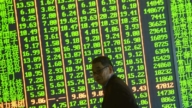【新唐人2012年5月15日訊】大陸央行宣佈,從5月18號開始,下調存款準備金率。在此之前,當局發佈的經濟數據顯示,4月份的經濟增長嚴重放緩,各項經濟指標普遍遠低於預期。因此外界普遍認為,央行此舉是為了增加貨幣供應、刺激經濟保增長。但專家警告,中國經濟的問題實際不是資金的問題。下面請看本臺記者的報導。
5月12號晚間,大陸央行宣佈,將從5月18號起,下調存款類金融機構人民幣存款準備金率0.5個百分點。這次下調生效後,存款準備金率將降到20%。這也是今年以來的第二次調降,2月,央行曾經將存款準備金率下調0.5個百分點。
而根據國家統計局此前發佈的經濟數據,4月份大陸工業較去年同期增長9.3%,遠低於12.2%的預期。同時,4月份的新增人民幣貸款、固定資產投資、進出口等數據也都低於預期。中國經濟增長已全面放緩。
《新唐人》特約經濟評論專家傑森:「這很明顯,就是中國現在是想用這種增加貨幣流通量的方式,下調準備金率就把市場上的貨幣數量增加了,這樣的話,銀行就可以多貸點款。它就希望藉此來刺激經濟。」
傑森分析指出,實際上中國經濟的最大問題並不是資金不足。
傑森:「中國的問題不是資金的問題,中國的問題更多的是:產業結構的問題、內需不足的問題、通貨膨脹可能引發的社會問題。所以說,目前(央行)這樣的舉措,釋放信號的因素要遠遠大於實際的經濟效果。」
剛剛獲得美國「2012弗裡德曼促進自由獎」的大陸經濟學家茅於軾也對《新唐人》表示,中國的經濟問題不單是存款準備金的問題。
茅於軾:「中國(經濟)的根本問題是國家壟斷。老百姓沒有自由進入的權利,這使得中國的效率就大大降低了。我們現在人均GDP只有美國的幾分之一,怎麼趕上去呀?潛力大得很,但是必須得改,把這個壟斷變成充分競爭。」
英國《金融時報》中文網,刊登「澳新銀行」大中華區首席經濟師劉利剛的分析也指出,「降準不是靈丹妙藥」。他質疑,利率水平已經不斷降低,但企業卻並沒有獲得足夠的信貸資源,真正獲益的反而是債券市場。這是為甚麼呢?
茅於軾:「中國金融業的問題是不能錢盡其用、錢用得好。你準備金怎麼調來調去,你不能解決這個問題,還是沒用。金融業的根本任務就是錢盡其用,把錢用好了。你調這個準備金當然有點用,但是根本問題沒解決。」
茅於軾指出,如果不改善資金支配和配置的效率,提高經濟增長率就會引來通貨膨脹。只有改善金融業的競爭狀況,取消壟斷,才可能兼顧經濟增長和通脹。
在此之前,有媒體曾評論說,中共高層忙於18大權鬥,因此而無暇處理目前的經濟困境。
但經濟評論專家傑森認為,大陸目前的經濟狀況是中國的經濟模式長期纍積的結果,和中共最近的權鬥沒關係。實際上,如果中共高層不去幹預經濟,中國經濟會穩定得多。
採訪/梁欣 編輯/李謙 後製/孫寧
Deposit Reserve Ratio Again Lowered Against Slow Growth
China’s Mainland Central Bank has announced a reduction
in the required deposit reserve ratio, starting from May 18.
Official data for April shows a serious slow of economic
growth—all economic indexes were far from expected.
The Central Bank’s policy is being widely read as an aim to
increase currency supply and stimulate economic growth.
Experts warn however, that China’s economic problem
is not a problem of currency.
Following an initial reduction of 0.5% in February,
the Mainland Central Bank announced on May 12 that
they will be reducing the RMB deposit reserve ratio
by a further 0.5% effect on May 18.
Thus, the deposit reserve fund rate
will be reduced to 20%.
China’s National Bureau of Statistics data shows that in April
the Mainland’s industries increased by 9.3% from last year, well below the expected 12.2%.
Increases in other areas—RMB loans, fixed assets investment,
import and export—are all below expected,
indicating an overall slowdown of China’s economic growth.
NTD economy critic, Jie Sen: “Obviously China is resorting to
increasing its currency circulation to stimulate economy.
Lowering the deposit reserve ratio means increasing the
currency on market, so banks will have more money to loan.
China hopes this will stimulate the economy.”
Jie Sen points out that China’s economic problem is not
one of having insufficient money.
Jie Sen: “China’s problem is not money but industrial structure;
lack of domestic demand and social consequences of inflation.
Therefore, the Mainland Central Bank’s policy
cannot achieve planned results.”
Mainland economist, Mao Yushi, winner of 2012 Milton
Friedman Prize for Advancing Liberty, also told NTD that
China’s economic problems are not just about
required deposit reserve.
Mao Yushi: “The fundamental problem of China’s economy
is state monopoly—
the denial of ordinary people’s access to
the market greatly reduced China’s efficiency.
China’s per capita GDP is only one quarter of that of America;
there’s enough potential for us to catch up, but monopoly
must be changed to free competition.”
The British Financial Times published a Chinese article titled:
“Lowering Deposit Reserve Ratio Is No Panacea”, written by
chief economist of ANZ Greater China District, Liu Ligang.
Liu Ligang expresses criticism that, lowered interest rates
do not bring companies enough credit resources, and only benefited the bond market.
Mao Yushi: “China’s financial problem comes from
inadequate and improper use of money.
It is useless to adjust the deposit reserve ratio without
solving this root problem—it’s no solution.
The fundamental task of the financial industry
is to make the best use of the nation’s money.”
Mao Yushi stated that Raising economic growth rates without improving
efficiency of the capital configuration will cause inflation.
Only by improving the financial industry’s competition state
can there be economic growth without inflation.
Media said earlier: the CCP is too busy with power struggles
at its 18th Assembly, to deal with the current economic plight.
Economic critic, Jie Sen, says China’s economic situation now
is the long-term result of China’s economic model—an issue
unrelated to the CCP’s current power struggle.
Jie Sen says, China’s economy would be much more stable
if the CCP officials did not intervene.


























